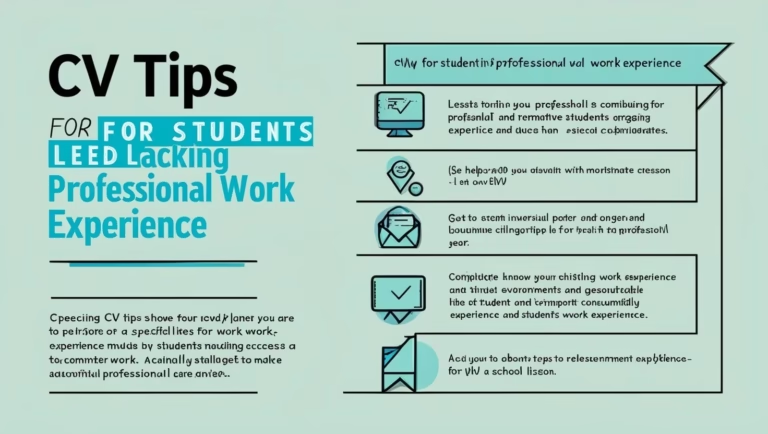How to Find Part-Time Jobs as a University Student
Balancing your studies and earning extra income can be a game-changer in college. Whether you’re trying to reduce student debt, gain work experience, or simply cover your monthly expenses, a part-time job can help. But finding a role that fits your schedule and skills as a university student can be tricky. This guide breaks down…
Balancing your studies and earning extra income can be a game-changer in college. Whether you’re trying to reduce student debt, gain work experience, or simply cover your monthly expenses, a part-time job can help. But finding a role that fits your schedule and skills as a university student can be tricky.
This guide breaks down practical strategies to help you find and land the right part-time job during your university years.
Why Work Part-Time in University?
Before we dive into the “how,” it’s worth understanding the “why.” Part-time jobs offer more than just a paycheck:
- Financial relief: Help cover tuition, rent, or daily expenses.
- Time management: Learn to balance responsibilities—a key skill for any career.
- Resume booster: Gain work experience that makes your resume stand out.
- Networking: Meet people who could help with future internships or job opportunities.
1. Know What Kind of Job You’re Looking For
Start by understanding your own availability, interests, and long-term goals. Ask yourself:
- How many hours a week can I realistically work?
- Do I need flexible scheduling?
- Am I looking for something related to my major?
Some popular part-time job categories for students include:
- On-campus roles (library assistant, lab tech, tour guide)
- Retail and food service (barista, cashier, server)
- Tutoring or academic support
- Freelance gigs (writing, design, social media)
- Internships with part-time hours
2. Use Your University’s Career Center
Most universities offer career services or job boards exclusive to students. These often list part-time roles on or near campus, including:
- Research assistant positions
- Administrative office help
- Student brand ambassador programs
- Peer tutoring opportunities
Pro tip: Sign up for job alerts or newsletters from your school’s career center to stay ahead of new postings.
3. Check Online Job Boards and Marketplaces
Besides your university resources, don’t overlook broader job search platforms. Try these:
- RealisticJobs.com – Search part-time roles designed for students and early-career professionals.
- Indeed – Use filters like “part-time” or “student job” and your location.
- Snagajob – Focuses on hourly and flexible work.
- Upwork or Fiverr – Great for freelancing if you have creative or technical skills.
Always tailor your resume and cover letter to each job. Even part-time employers want to see that you’ve read the job description and can bring value to the role.
Related: Job Boards vs. Company Career Pages: Where Should You Apply?
4. Ask Around: Word of Mouth Still Works
Sometimes the best job opportunities come from someone you know. Let friends, professors, and classmates know you’re looking for part-time work. They might:
- Recommend you to a local business
- Know about opportunities before they’re posted
- Connect you to alumni hiring for remote roles
Don’t underestimate casual conversations—you never know who’s hiring.
5. Look for On-Campus Employment
One of the most student-friendly options is an on-campus job. These usually offer flexible hours, low commute time, and understanding supervisors. Common on-campus jobs include:
- Campus bookstore or cafe staff
- Library desk assistant
- Fitness center attendant
- Event staff
Many of these roles also allow you to study during downtime, making them a great way to multitask.
6. Be Open to Remote Work
The rise of remote work has created more opportunities than ever for students. From customer service to virtual assistance to freelance writing, there’s a remote gig for nearly every skill set.
Benefits of remote work for students:
- No commute
- Often more flexible scheduling
- Opportunities to build a digital portfolio
When searching online, use keywords like “remote,” “virtual,” or “work from home” alongside “part-time.”
Related: Top 15 Companies Hiring Remote Workers in 2025″
7. Build a Student-Friendly Resume
Even if you don’t have much experience, you can build a compelling resume by highlighting:
- Coursework related to the job
- Volunteer work
- Club or leadership roles
- Projects or presentations
Bonus tip: Keep your resume to one page and include a short, focused summary at the top explaining what you’re looking for (e.g., “Motivated communications student seeking part-time marketing assistant role”).
8. Prepare for Interviews
Just because it’s a part-time role doesn’t mean you shouldn’t take the interview seriously. Prepare by:
- Researching the company
- Practicing common interview questions
- Having a few questions ready to ask the employer
Dress neatly (even for virtual interviews), be on time, and follow up with a thank-you email.
9. Stay Organized
Juggling classes, deadlines, and work shifts requires solid time management. Use tools like Google Calendar or Notion to:
- Track job application deadlines
- Log interviews or follow-up dates
- Block out availability for potential shifts
This will help you stay on top of your job search and school work without burning out.
Final Thoughts
Landing a part-time job as a university student is about more than making money—it’s about building skills, meeting people, and preparing for life after graduation. With the right mindset and tools, you can find a role that fits your schedule and supports your goals.
If you’re ready to start searching, check out the latest student-friendly jobs on RealisticJobs.com today.




